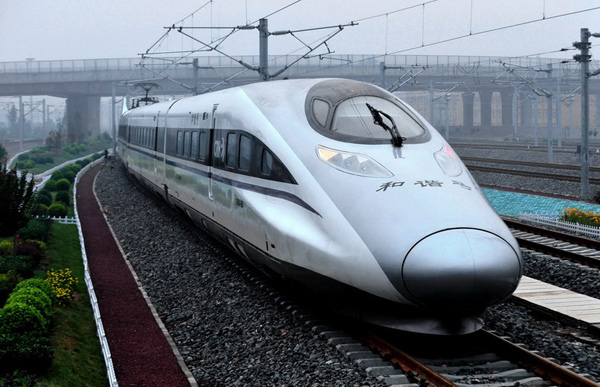

 |
| (File photo) |
The unilateral cancellation of a high-speed rail contract between a U.S. company and a Chinese firm is actually a form of trade protectionism that not only smashes the credit of the U.S., but also hurts the interests of the American people along the route, many experts said.
Those statements followed the move last week by Nevada’s XpressWest to abort the deal it had made with China Railway International to build a high-speed railway from Los Angeles, California, to Las Vegas, Nevada.
In a statement posted online, XpressWest said it was constrained by U.S. government regulations, explaining that the biggest challenge continues to be the federal government's requirement that high-speed trains must be manufactured in the U.S.
Experts pointed out that the termination is a betrayal of the spirit of contract praised by the American community as it should be upon agreement of both sides, adding that the explanation provided by XpressWest was farfetched.
Teng Jianqun, director of American Studies at the China Institute of International Studies, criticized that exclusion of other countries from the construction of its railways by the federal government is a form of trade protectionism.
Wang Mengshu, academician of the Chinese Academy of Engineering, also noted that the China-built high-speed rails are competitive in technique, teams and cost-performance. Its technologies also take a leading position around the globe.
According to experts, China's efforts in the global high-speed rail market can not only benefit Chinese enterprises, but also assist related countries to improve their infrastructures and help bring other benefits to local people as well.
Zhang Jianping, director of the Department of International Economic Cooperation at the Institute for International Economic Research of National Development and Reform Commission noted that, the sudden termination of the cooperation is an extension of trade friction.
He further pointed out that by doing so, the U.S. also aims to protecting domestic industries and pressuring China’s manufacturing, explaining that the high-tech industries can leverage more demand of up-stream and down-stream products such as steel and electrical equipment.
But its move does not conform with its long-term interest as the infrastructure of the country at present is not as advanced as before, Zhang added.
Yang Jian, a professor from the University of Colorado Denver, advised that the U.S. should get used to win-win cooperation with Chinese enterprises, while China should also be aware of the political risks at hand when engaging in international investment and trade.
 Five made-in-China hi-tech breakthroughs
Five made-in-China hi-tech breakthroughs Beijing Style: Hot pants
Beijing Style: Hot pants HK-Zhuhai-Macao Bridge to open to traffic
HK-Zhuhai-Macao Bridge to open to traffic China opens its first combined transport service to Nepal
China opens its first combined transport service to Nepal Students take stylish bikini graduations photos
Students take stylish bikini graduations photos Charming dancing students pose for graduation photos
Charming dancing students pose for graduation photos Guizhou, Yunnan section of Shanghai-Kunming railway connected
Guizhou, Yunnan section of Shanghai-Kunming railway connected Naked models transformed into landscapes, birds and even DRAGONS by body painting artist
Naked models transformed into landscapes, birds and even DRAGONS by body painting artist World’s biggest cruise ship Harmony of the Seas to start maiden voyage
World’s biggest cruise ship Harmony of the Seas to start maiden voyage Top 20 hottest women in the world in 2014
Top 20 hottest women in the world in 2014 Top 10 hardest languages to learn
Top 10 hardest languages to learn 10 Chinese female stars with most beautiful faces
10 Chinese female stars with most beautiful faces China’s Top 10 Unique Bridges, Highways and Roads
China’s Top 10 Unique Bridges, Highways and Roads Live streamer stirs up controversy by playing a woman
Live streamer stirs up controversy by playing a woman Avoiding middle-income trap relies on Chinese reforms
Avoiding middle-income trap relies on Chinese reforms Q&A site becoming platform for celebrity gossip experts
Q&A site becoming platform for celebrity gossip experts Protests erupt over college enrollment for minorities at Beijing high school
Protests erupt over college enrollment for minorities at Beijing high schoolDay|Week